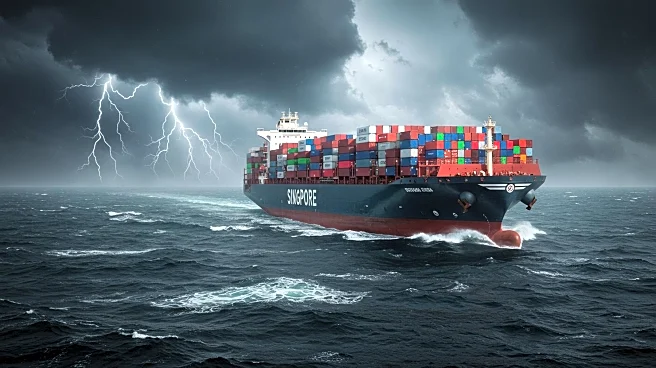What's Happening?
Singapore's non-oil domestic exports experienced a significant decline in July, with shipments to the United States dropping by 42.7 percent compared to the previous year. This downturn is largely attributed to a 93.5 percent decrease in pharmaceutical exports, as reported by Enterprise Singapore. The decline in exports to the US, Singapore's largest market, is compounded by recent tariff announcements from President Trump, including a 100 percent tariff on chips from firms not investing in the US and potential levies of up to 250 percent on pharmaceutical imports. Additionally, exports of specialized machinery and food preparations fell by 45.8 percent and 48.8 percent, respectively. Despite these challenges, Singapore's trade ministry has adjusted its economic growth forecast for 2025 to 1.5-2.5 percent, acknowledging the global uncertainty driven by US tariffs.
Why It's Important?
The sharp decline in Singapore's exports to the US highlights the vulnerability of small, open economies to international trade policies and tariffs. As the US imposes higher tariffs, industries such as pharmaceuticals and semiconductors face increased pressure, potentially leading to reduced competitiveness and economic strain for Singapore. This situation underscores the broader impact of trade barriers on global supply chains and economic growth, particularly for countries heavily reliant on exports. The adjustments in Singapore's economic growth forecast reflect the cautious optimism amid ongoing global trade tensions, emphasizing the need for strategic adaptation in response to shifting international trade dynamics.
What's Next?
Singapore's Prime Minister Lawrence Wong has expressed concerns over the potential for increased tariffs, indicating that the country must prepare for more trade barriers. The government may need to explore alternative markets and strengthen trade relations with other regions, such as the EU, Taiwan, South Korea, and Hong Kong, where exports have shown growth. Additionally, Singapore might consider policy measures to mitigate the impact of US tariffs and support affected industries. The evolving trade landscape will require ongoing monitoring and strategic adjustments to ensure economic resilience.
Beyond the Headlines
The situation presents ethical and strategic considerations for Singapore and other small economies facing similar challenges. The reliance on international trade necessitates a balance between maintaining competitive export markets and navigating protectionist policies. This scenario may prompt discussions on the ethical implications of trade barriers and the need for collaborative international trade agreements that promote fair competition and economic stability.









